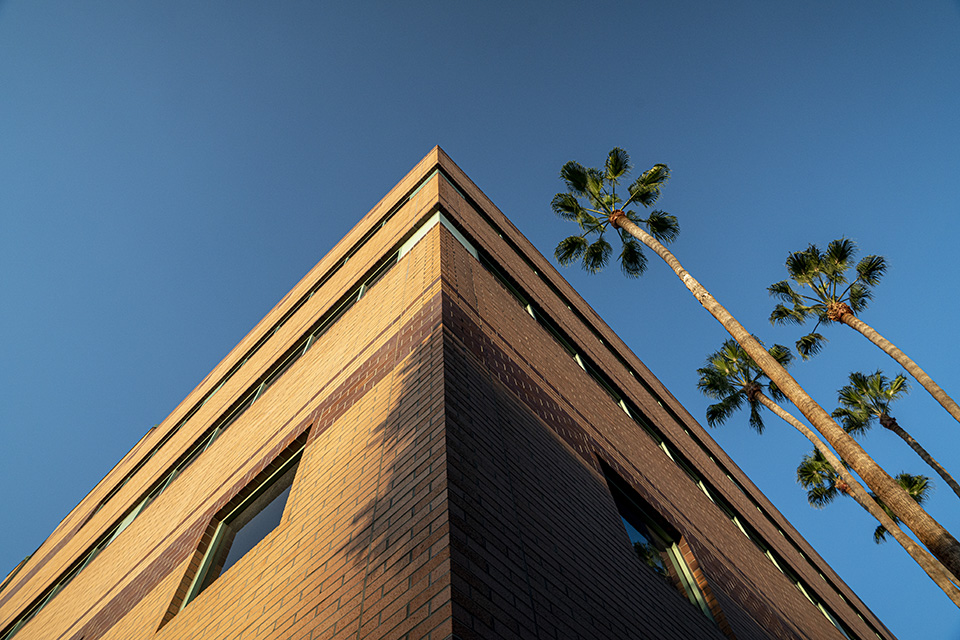
CSUN’s Jacaranda Hall. Photo by Lee Choo.
By Willa Zhang
Hands-on learning is crucial to the College of Engineering and Computer Science experience. On any given day of an academic year before 2020, students could be found in labs working on experiments, preparing for regional and national competitions, and designing solutions to problems big and small.
When COVID-19 struck last spring and the university pivoted to online learning, college faculty and staff were confronted with an entirely new set of challenges: How could they translate the hands-on lab experience into an online format? What resources and supplies would faculty need to transition from traditional instruction to virtual instruction?
“The spring semester was very tough,” said Houssam Toutanji, dean of the College of Engineering and Computer Science. “When we pivoted to online, we didn’t have much time to prepare. Our students were not ready for it.”
But ready or not, the college jumped into action and found solutions. One way to keep labs going in the summer was to hold them outside. One at a time, students arrived on campus to pick up their equipment and bring it outside. While working, they were required to adhere to COVID safety protocols — staying masked and socially distanced. Each piece of lab equipment was cleaned and sanitized before being returned.
In order to conduct labs indoors during the fall semester, the college made the decision to break up lab groups into smaller groups of students. A typical lab of 24 students became three groups of eight students. These smaller groups arrived on campus to conduct experiments in the lab, while their 16 classmates observed via video. In this way, students were able to have a safe mix of hands-on and observational experiences.
“It isn’t perfect, but we aren’t living in perfect times right now,” Toutanji said.
For certain labs, the college also provided kits for students to pick up from campus. Using money from the federal government’s CARES Act, CSUN purchased tens of thousands of dollars’ worth of lab kits for at-home experiments. These solutions allowed students to stay engaged in hands-on learning and on track with their majors.
Mobilizing Students and Faculty
All non-lab classes were moved online. One staff member who was crucial in this effort was Emil Henry. He is the college’s manager of technical services, and his unit, Information Systems, is responsible for all computer and engineering machine shop equipment across the college.
That includes approximately 1,200 machines — from projectors and printers to desktop PCs and workstations, servers and supercomputers.
Henry’s team of 10 received one week’s notice from the university before the campus transitioned to primarily online. Moving quickly, the team organized training workshops to teach faculty how to connect their webcams and create home office set-ups. They coordinated equipment, ensuring that faculty and staff had access to everything from WiFi hotspots to laptop computers.
“I was in school a long time ago, but I know it’s a real struggle for the students and faculty. It’s not easy for them,” Henry said. His team continues to be at the ready to help solve the technical issues that inevitably arise.
There were hiccups in the transition, of course. Lectures online suddenly limited the interaction between students and faculty. Students and faculty had to learn to ask and respond to questions using the Zoom chat function, which could be confusing. The format of quizzes and final exams had to be completely reimagined. The entire process of learning left students feeling frustrated at times.
But College of Engineering and Computer Science students and faculty are engineers and computer scientists — they are problem solvers at heart. They’ve found innovations, solutions and resources to make the new normal work. Communication has been constant and strong between faculty, staff and students, and over time, the feedback from students and faculty on their experience has improved.
Helping Health Care Workers
The college’s problem-solving attitude extended beyond campus. In March, even in the confusion of the transition to online learning, faculty were alert to where their skills might come in handy. When they learned of the critical shortages in personal protective equipment (PPE) that hospitals around the country and in Los Angeles were facing, they jumped into action.
Led by professor Bingbing Li, assistant professor in the Department of Manufacturing Systems Engineering and Management, faculty began producing potentially life-saving face shields for doctors and nurses on the front lines of care. Using 3-D printers in his CSUN lab, Li crafted hundreds of shields for donation to intensive care units.
“The face shields protect front-liners and us. That’s my motivation. Since I have these printers and supplies, I put them to use and was ready to help,” Li said.
Meanwhile, students faced their own challenges outside the classroom. Student organizations are normally very active in national competitions, producing innovative projects that often earn national awards. The experience they gain from preparing for the competitions, the travel to different cities and the professional networking could not be recreated online. College leaders are hopeful that they can recreate the success of the outdoor labs and bring a limited number of students to campus with masks and social distancing, to prepare for competitions in the near future.
Seniors, who had worked hard preparing capstone projects all year, were initially disappointed not to have the opportunity to bring their work to in-person competitions. However, the college hosted a virtual Senior Design Project Showcase, where seniors wowed the audience with projects such as a student-built Formula One race car, a human-powered vehicle and a floating concrete canoe. Industry leaders and alumni were invited to watch and provide feedback and support.
“It gave us the opportunity to show the college what we’ve been working so hard on in the lab for a year,” said mechanical engineering senior Jacob Vorzimer.
At the end of the 2019-20 academic year, the college held a virtual commencement to honor graduating seniors and recognize the challenges they’d overcome. The hour-long celebration featured photos that students had submitted, with memories of their last year as Matadors and their academic journeys — from their first day of classes to images of seniors dressed in graduation robes at home.
From hours spent in labs to pivoting to a virtual environment during a global pandemic, the Class of 2020’s experience was unique. To commemorate their time together, the College of Engineering and Computer Science will present a Challenge Coin to each graduate. These coins represent the achievements and accomplishments of each student, and the close-knit bonds they forged. College leaders said they hope the coins will become a longstanding tradition, so that future graduates will be bound by a symbol of the challenges they overcame together.
Toutanji credited the college’s success in this time, in part, to the resilience of CSUN students.
“They’re often first-generation students who never really had it easy,” Toutanji said. “If you put them in these difficult times, they know how to overcome challenges. The willingness to do whatever it takes to get the job done — that was a great thing to see in the college.”
Jacob Bennett, Amy Hamaker, Liezl Bitas and Cary Osborne contributed to this report.
CSUN CREATES, DONATES PROTECTIVE GEAR FOR HEALTH CARE WORKERS
By Jacob Bennett
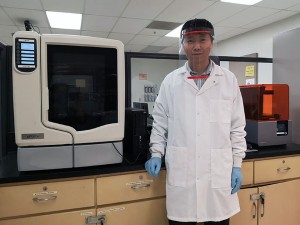
Bingbing Li, CSUN assistant professor of manufacturing systems engineering and management, wears a face shield created in his lab. Li is using 3-D printers to create face shields for health care workers. Photo courtesy of Bingbing Li.
CSUN departments across campus worked together this past year to create potentially life- saving face shields for health care workers facing the surge of COVID-19 patients in Los Angeles.
Bingbing Li, assistant professor of manufacturing systems engineering and management at CSUN, worked hard to create face shields for organizations including UCLA Health
– West Hills, Gallup Indian Medical Center, Tzu Chi Medical Center, the CSUN National Center on Deafness and CSUN Klotz Student Health Center. In total, he donated 850 face shields, primarily in Southern California.
The CSUN Library’s Creative Media Studio donated 60 rolls of 3-D printer filament, necessary to make the face shields, and loaned Li two 3-D printers to increase his capacity and speed up production.
The face shields consisted of visors with an attached shield that stretches below the chin and around the sides of the face to block contagions. Li used 3-D printers in his CSUN lab to print the face shields, which took about two hours each to produce.
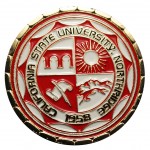
CELEBRATING THE CLASS OF 2020 VIA ZOOM
By Willa Zhang
Graduating seniors in the CECS Class of 2020 celebrated their achievements a bit differently in 2020. Due to the restrictions of the pandemic, the college pivoted to hold a virtual celebration that streamed live on May 15, 2020. The virtual format offered students the opportunity to submit photos of their experience throughout their time in the college. A slideshow of memories captured CECS students proudly wearing their black and red graduation gowns, attending competitions together, working in the classroom, and smiling alongside family and friends.
“We are so proud of each one of you,” said Dean Houssam Toutanji. “Look where you are now. An alum of CSUN and a Matador for life. Congratulations!”
The virtual commencement also recognized undergraduate and graduate students of the college who were honored as Outstanding Students of CSUN, chosen by their respective department chairs. The chairs read out each student’s name and gave warm congratulations.
Toutanji commended the sacrifices that students made in order to pursue their education, and thanked the parents, spouses, partners, children, grandparents, and other significant individuals who encouraged and supported each graduate.
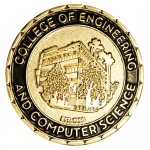
Recognizing the achievements and accomplishments of CECS students, the college plans to begin presenting graduates with Challenge Coins. These gold coins will mark students as members of a close-knit community who overcame challenges together. Each year, new graduates of CECS will receive their coin, a symbol that will link them to fellow CECS graduates who have come before them in what will hopefully become a long-standing tradition in the college.
SENIOR DESIGN PROJECT SHOWCASE GOES VIRTUAL
By Liezl Bitas and Cary Osborne
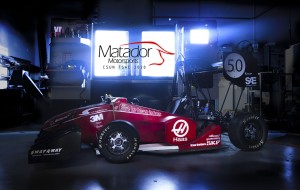
The College of Engineering and Computer Science’s annual Senior Design Project Showcase took the form of a live, online presentation this past year, instead of the traditional in-person competition.
“[Presenting at the May 1 showcase] gave us a little bit of closure for our project, because we got to show what we actually did,” said Jacob Vorzimer ‘20 (Mechanical Engineering). “It also gave us the opportunity to show the college what we’ve been working on so hard in that lab for a year. And it felt really good.”
Vorzimer and the dozens of members of the Formula SAE Internal Combustion Vehicle team worked as many as 60 hours a week during the 2019-20 academic year to build and test their race car. Vorzimer said he and his fellow seniors hoped to keep the ball rolling, even beyond graduation, to continue manufacturing and testing their vehicle over the summer and have it ready in time for an online competition in June.
At CSUN’s online showcase, students wowed the virtual audience with 24 projects, which included a drone that can save lives, a robot that can paint walls, a canoe made out of concrete that can float, a computer system that can control a fleet of bots, and much more. Students presented their work in 15-minute oral presentations through Zoom, which enabled them to share slideshow presentations and demos with audience members.
CSUN’S HUMAN POWERED VEHICLE TEAM PLACES SECOND AT GLOBAL COMPETITION
By Perla Colin
CSUN mechanical engineering students placed second at the 2020 American Society of Mechanical Engineers’ (ASME) Human-Powered Vehicle Challenge, hosted online April 25.
Originally scheduled to take place April 3-5 on the Michigan State University campus, the worldwide engineering competition and conference went virtual through Zoom, due to COVID-19. Attendance was still high, as 35 universities gathered online to show off their human-powered vehicles.
CSUN’s Human-Powered Vehicle team, a senior design team made up of 23 mechanical engineering students, swept top contenders including University of Southern California, Harvard and UC San Diego in the Human-Powered Vehicle Challenge. This marked the third year in a row Matadors have placed among the top three winning universities.
The challenge encourages mechanical engineering students to demonstrate their engineering, analysis and manufacturing knowledge by designing and building a sustainable, human-powered vehicle.
The CSUN vehicle, “El Matador,” had been in the works for a year as part of a two-semester senior design project. The team spent the first semester researching and designing the vehicle and the second semester building and testing it.
